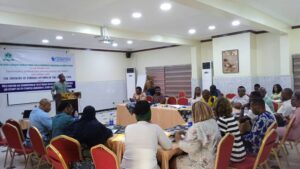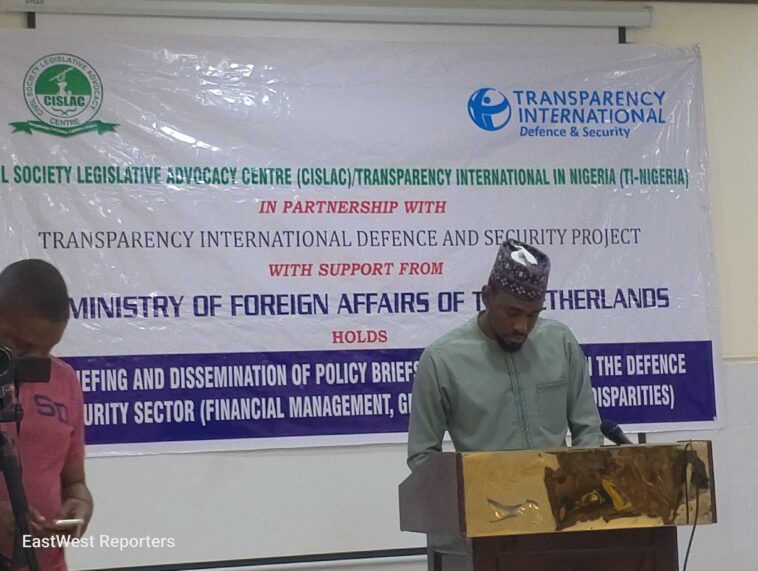The Civil Society Legislative Advocacy Centre(CISLAC) and Transparency International (TI) in Nigeria has named the major drivers of corruption in the Defence and Security sector.
CISLAC/TI in partnership with Transparency International Defence and Security Project with Support from The Ministry of Foreign Affairs of Netherlands on Tuesday Novembers 12th ,2024 in a press briefing and dissemination of policy briefs on Anti-Corruption in The Defence And Security Sector(Financial Management, Gender and Operational Disparities) listed shady procurement process, excessive secrecy in procurement process and spending, inter-agency rivalry, inflated procurement, phantom contracts, delayed appropriation process with weak oversight activities as major drivers of corruption in the sector.
CISLAC/TI also tasked the media to independently interrogate the transparency and accountability gap in the sector.

Full Text Of The briefings-
I am delighted to welcome you all to this very important Session. You would agree with me that there is no better time to engage the media to independently interrogate the existential transparency/accountability gaps in Nigeria’s Defence and Security sector.
The event is considered necessary because reform initiatives in the Defence and Security sector must remain sacrosanct particularly at a time like this when Nigeria’s battles with evolving epidemy of multidimensional security threats such as the fight against boko haram sect whose agitation is allegedly based on religious ideology against western education, banditry, kidnapping, terrorism and other armed opposition groups like the Islamic State – West Africa Province (ISWAP), including factions of agitated groups under the guise of Indigenous People of Biafra (IPOB), Eastern Security Network (ESN), and unrecognized armed (political) groups within communities, parading themselves as security agents yet engaging in destructive tendencies inimical to lives and properties.
While Nigeria’s defence and security sector must always be seen as carrying out its mandate in an objective manner, reform initiatives in the sector must remain sacrosanct particularly at a time like this when Nigeria battles with evolving epidemy of multi-dimensional security threats
Defence Sector on the one hand, is acknowledged to have adopted various reforms in the recent past to enhance its integrity and improve its effectiveness. However, 33 years of military rule and the culture of exceptionalism had impacted negatively on the transparency of the sector.
Major drivers of corruption in the Defence and Security sector include shady procurement process; excessive secrecy in procurement process and spending; inter-agency rivalry; inflated procurement and ‘Phantom Contracts; delayed appropriation process; weak oversight activities.
These challenges in effect, have hitherto hampered counterterrorism operations; empowered insurgency and discouraged front-line troops; endangered security of lives and property; threatened democratic governance mechanisms; limited operational effectiveness; lowered morale and regard for the defence institutions.
Just as the commitments and expertise necessary to implement sustainable changes were not always available, the military governance mechanisms were not always fit-for-purpose and the troops often under-resourced.
In recent times, there has also been many high-profile corruption cases levelled against the sector that made media headlines but somehow, they just disappeared, and nothing was heard of them again.
Although these corrupt activities happened, their perpetrators still go about their daily activities freely with so much impunity because certain political interest must be protected.
More importantly, a recent analysis indicated that over 80% of military personnel have been deployed in internal security operations across the 36 states of the nation with whopping sums budgeted for insecurity nationally. This goes to show that the prolonged fight against insecurity, even though very expensive, is yet to record the desired impact or effectiveness.
Similarly, military operations in recent times have been over-weaponized to pave way for continued procurement and diversion of weapons funds as well as unaccountable engagement of foreign Private Military Companies. For instance, in June 2022, Independent Corrupt Practices and Other Related Offences Commission (ICPC) raided a home of the Managing Director of K. Salam Construction Company, a military contractor in Abuja, in suspicion of money laundering. The Commission allegedly recovered over N1.8billion cash and other items from the property including G-Wagon; 2022 editions of BMW and Mercedes Benz cars; customized mobile phones; several designer wristwatches, including three Rolexes, and some property documents.
Some State Governors have found the engagement of foreign military contractors and private security services as an enabler to avoid transparency and accountability of the spending of their Security Votes. By September 2019, Transparency International, TI, raised alarm that over N241.2 billion annually spent on security votes was not accounted for by the Government in Nigeria.
Moreover, we are delighted to leverage the uniqueness of this event to launch some of our products of critical research that interrogated financial/procurement, operational, gender issues in the Defence and Security sector.
Giving this background, the need for media agender setting to provoke independent oversight and immediate reform in the defence and security sector cannot be over emphasized, particularly with respect to financial transparency, gender inclusion as well as operational disparities as these have significantly impacted the overall integrity and efficiency of the sector.
For this reason, the Civil Society Legislative Advocacy Centre (CISLAC) in collaboration with Transparency International Defence and Security Project (TI-DSP) with support from the Ministry of Foreign Affairs of the Netherlands, holds this Press Briefing towards repositioning the defence and security sector for more efficiency and transparency.
Thank You!
Signed: Auwal Ibrahim Musa (Rafsanjani)
Executive Director, CISLAC
Head of Transparency International in Nigeria



